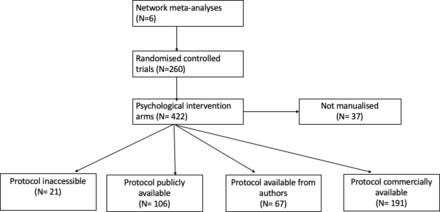Access Denied? The Difficulty of Finding Publicly Available Treatment Manuals
Why You Can’t Find the Treatment Protocols You Need
As therapists, we’re often reminded of the importance of fidelity: delivering evidence-based interventions in ways that closely align with how they were validated in research. In other words, treating clients in ways that are grounded in research.
But how accessible is this research? And what happens when the research is not available?
A recent study tackled this question head-on by surveying 260 randomly controlled trials of psychological treatments for severe mental disorders including psychosis, borderline personality disorder, substance use, bipolar disorder, anorexia, and bulimia.
The researchers’ goal was to assess whether treatment protocols or manuals used in these studies were accessible and, if so, whether they were publicly or commercially available.
For close to one year, a team of seven researchers scanned research trial databases, contacted over 450 authors, and even searched for commercially available manuals online. Despite these considerable efforts, the findings revealed a challenging landscape:
86% of treatment protocols were successfully retrieved, but access varied:
25% were freely available to the public (e.g., online or published with the study).
Only 8% were published separately, either as standalone documents or in study appendices.
45% were only available commercially, meaning researchers had to pay to access them.
16% were shared directly by authors after outreach—they weren’t publicly or commercially available elsewhere.
14% of protocols were not retrievable at all:
Some of these treatments were explicitly non-manualized.
Others had unpublished or inaccessible manuals, even after multiple contact attempts.
Additional outreach insights:
30% of contacted authors declined to share their protocols and pointed researchers to commercial sources instead.
42% never responded, despite follow-up attempts.
One of the core challenges in closing the research-to-practice gap is the limited access to treatment manuals and detailed protocols. While manuals aren’t the sole foundation of clinical work as therapists also draw on clinical judgment, context, and client needs, the research shows that many intervention protocols are difficult to find. As a result, clinicians and researchers are often left with only vague or incomplete descriptions, making it harder to understand or apply the interventions effectively.
This problem reflects a deeper tension in mental health (and probably in many other fields as well): we aim to create treatments that are scalable and evidence-based, but the foundational materials such as manuals, delivery guidance, and training requirements, are often missing from the public record.
To improve this, journals and funders could mandate that protocols be published with the findings of the research study. Public repositories for treatment manuals could make a big difference, not just for clinicians, but also for researchers conducting meta-analyses or implementation studies.
This problem is especially urgent in low- and middle-income countries, where accessing commercial manuals can be prohibitively expensive. But even in well-resourced settings, the time and effort needed to track down materials can be a barrier.
As therapists, we aim to deliver care that is both evidence-based and personalized, but that goal is undermined when treatment protocols remain locked behind paywalls or buried in inaccessible citations. Making these resources publicly available is not merely an academic issue, but an ethical requirement.
To improve mental health outcomes globally, we must not only produce new research, but focus on making existing evidence usable. This requires a collective effort from journals, funders, professional associations, and researchers to ensure treatment protocols are accessible, adaptable, and ready for real-world application. Only then can the full promise of evidence-based care be realized for those who need it most.
Attribution: This summary was created by the team at Psychvox and is based on insights from the article “Access to treatment protocols and manuals for evidence-based psychological interventions for severe mental disorders: a survey of randomised trials included in network meta-analyses” by Chrysanthi Blithikioti and colleagues. All rights to the original research remain with the authors and the publisher. This summary is intended for educational purposes only and does not imply endorsement by the original authors. The article is licensed under the Creative Commons Attribution 4.0 International License (CC BY 4.0).
Written by: Manuel Stoilov, LCSW
Edited by: Stephanie Carvajal, LCSW



